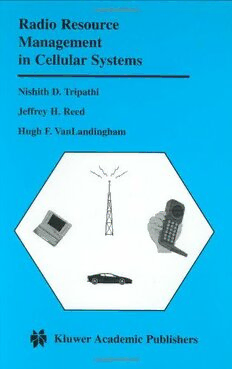Download Radio resource management in cellular systems PDF Free - Full Version
Download Radio resource management in cellular systems by Nishith D. Tripathi, Jeffrey Hugh Reed, Hugh F. Van Landingham in PDF format completely FREE. No registration required, no payment needed. Get instant access to this valuable resource on PDFdrive.to!
About Radio resource management in cellular systems
Radio Resource Management in Cellular Systems is the first book to address the critical issue of radio resource management in emerging (i.e., third generation and beyond) wireless systems. This book presents novel approaches for the design of high performance handoff algorithms that exploit attractive features of several existing algorithms, provide adaptation to dynamic cellular environment, and allow systematic tradeoffs among different system characteristics. Efficient handoff algorithms cost-effectively enhance the capacity and quality of service (QoS) of cellular systems. A comprehensive foundation of handoff and related issues of cellular communications is given. Tutorial-type material on the general features of 3G and 3.5G wireless systems (including CDMA2000, UMTS, and 1xEV-DO) is provided. Key elements for the development of simulators to study handoff and overall RF performance of the integrated voice and data cellular systems (including those based on CDMA) are also described. Finally, the powerful design tools of neural networks and fuzzy logic are applied to wireless communications, so that the generic algorithm approaches proposed in the book can be applied to many other design and development areas. The simulation models described in the book represent a single source that provides information for the performance evaluation of systems from handoff and resource management perspectives. Radio Resource Management in Cellular Systems will prove a valuable resource for system designers and practicing engineers working on design and development of third generation (and beyond) wireless systems. It may also be used as a text for advanced-level courses in wireless communications and neural networks.
Detailed Information
| Author: | Nishith D. Tripathi, Jeffrey Hugh Reed, Hugh F. Van Landingham |
|---|---|
| Publication Year: | 2001 |
| ISBN: | 9780792373742 |
| Pages: | 248 |
| Language: | English |
| File Size: | 4.188 |
| Format: | |
| Price: | FREE |
Safe & Secure Download - No registration required
Why Choose PDFdrive for Your Free Radio resource management in cellular systems Download?
- 100% Free: No hidden fees or subscriptions required for one book every day.
- No Registration: Immediate access is available without creating accounts for one book every day.
- Safe and Secure: Clean downloads without malware or viruses
- Multiple Formats: PDF, MOBI, Mpub,... optimized for all devices
- Educational Resource: Supporting knowledge sharing and learning
Frequently Asked Questions
Is it really free to download Radio resource management in cellular systems PDF?
Yes, on https://PDFdrive.to you can download Radio resource management in cellular systems by Nishith D. Tripathi, Jeffrey Hugh Reed, Hugh F. Van Landingham completely free. We don't require any payment, subscription, or registration to access this PDF file. For 3 books every day.
How can I read Radio resource management in cellular systems on my mobile device?
After downloading Radio resource management in cellular systems PDF, you can open it with any PDF reader app on your phone or tablet. We recommend using Adobe Acrobat Reader, Apple Books, or Google Play Books for the best reading experience.
Is this the full version of Radio resource management in cellular systems?
Yes, this is the complete PDF version of Radio resource management in cellular systems by Nishith D. Tripathi, Jeffrey Hugh Reed, Hugh F. Van Landingham. You will be able to read the entire content as in the printed version without missing any pages.
Is it legal to download Radio resource management in cellular systems PDF for free?
https://PDFdrive.to provides links to free educational resources available online. We do not store any files on our servers. Please be aware of copyright laws in your country before downloading.
The materials shared are intended for research, educational, and personal use in accordance with fair use principles.

